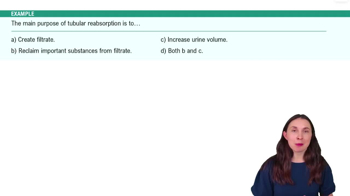Renal Physiology: Overview definitions Flashcards
 Back
BackRenal Physiology: Overview definitions
1/15
Terms in this set (15)
- NephronsFunctional units of the kidney responsible for filtering blood and forming urine through distinct physiological processes.
- Glomerular FiltrationInitial process in urine formation where blood pressure forces water and solutes into the capsular space, forming filtrate.
- FiltrateFluid formed during glomerular filtration, containing water and solutes forced out of blood into the capsular space.
- Tubular ReabsorptionProcess of reclaiming essential substances like water, electrolytes, and glucose from filtrate back into the bloodstream.
- Proximal TubulePart of the nephron where most reabsorption of essential substances from filtrate occurs.
- Nephron LoopSegment of the nephron involved primarily in reabsorption, with no secretion occurring.
- Distal TubuleNephron segment where both reabsorption and secretion occur, contributing to urine formation.
- Collecting DuctStructure in the nephron where final urine concentration is adjusted through reabsorption and secretion.
- Tubular SecretionProcess of transferring substances from the bloodstream into the renal tubule to maintain balance and remove toxins.
- Electrolyte BalanceMaintenance of optimal concentrations of ions like sodium and potassium in the body, crucial for cellular function.
- Acid-Base BalanceRegulation of pH levels in the body, essential for normal cellular activities and metabolic processes.
- Renal CorpuscleStructure in the nephron where glomerular filtration occurs, consisting of the glomerulus and Bowman's capsule.
- Capsular SpaceArea within the renal corpuscle where filtrate collects after being forced out of the blood during filtration.
- Blood-Derived FluidFluid processed by the kidneys daily, from which filtrate is formed and mostly reabsorbed back into the blood.
- UrineFinal excretory product of the kidneys, formed after filtration, reabsorption, and secretion processes.


